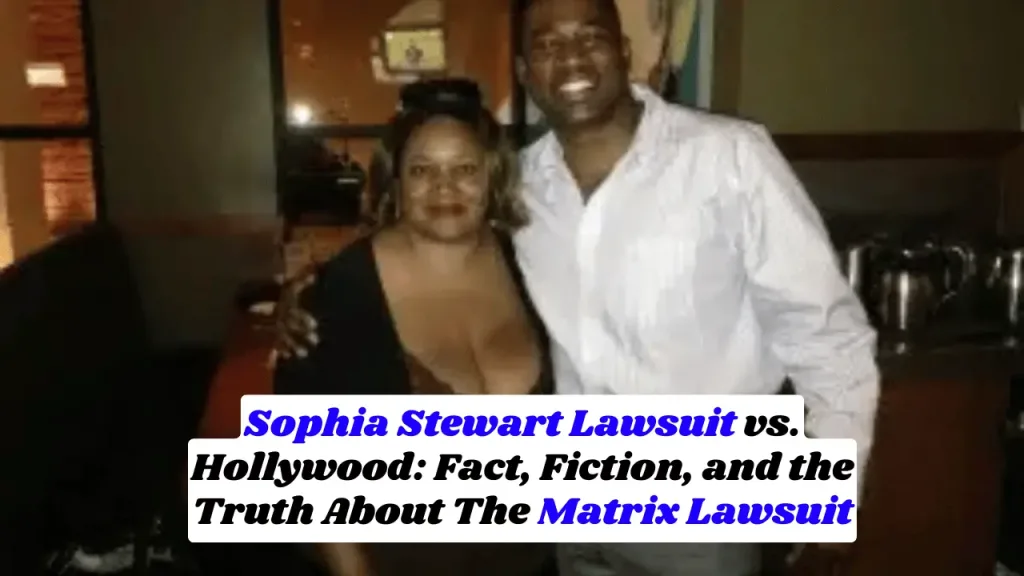Sophia Stewart Lawsuit vs. Hollywood: Fact, Fiction, and the Truth About The Matrix Lawsuit
Sophia Stewart, a writer and self-described “Mother of the Matrix,” has been at the center of a viral legend claiming she won a massive $2.5 billion lawsuit against the creators of The Matrix and The Terminator franchises. This story has captivated the public imagination for years but is far removed from the actual legal proceedings. Here, we delve into the facts, debunk the myths, and explore the ongoing fascination with Stewart’s case.
Table of Contents
Who Is Sophia Stewart?
Sophia Stewart is a writer and paralegal who alleges that her 1983 screenplay The Third Eye was plagiarized to create The Matrix and The Terminator. According to Stewart, she responded to a 1986 magazine ad by the Wachowskis soliciting science fiction material for a comic book. Stewart claims she submitted her manuscript but received no acknowledgment, only to later recognize similarities between her work and the films.
When The Matrix premiered in 1999, Stewart said its themes, characters, and storylines mirrored her manuscript, prompting her to file a lawsuit in 2003 against Warner Bros., the Wachowskis, James Cameron, and 20th Century Fox.
The 2003 Lawsuit: Claims and Court Dismissal
Stewart’s 2003 lawsuit alleged copyright infringement and racketeering, desiring over $1 billion in damages. However, the case faced significant hurdles and was dismissed in 2005. Key points of the dismissal include:
- No Striking Similarity: The court found no compelling evidence of plagiarism between The Third Eye and the films in question.
- Failure to Present Evidence: Stewart and her legal team did not provide adequate evidence to substantiate her claims.
- Court Appearance Dispute: Reports indicate that Stewart did not attend her court date, though she denies this.
- Defendant Compensation: The court awarded over $300,000 in attorney fees to the defendants, though Stewart claims this amount was never collected.
Despite the dismissal, Stewart has maintained that her work was stolen and attributes her legal losses to corruption within the judicial system.
The $2.5 Billion Myth
The viral claim that Stewart won a $2.5 billion settlement originates from a 2004 article by The Salt Lake Community College Globe. The publication inaccurately reported that Stewart had triumphed in her lawsuit, citing an early procedural victory as evidence of a revolutionary win. Although the article was later corrected, the false narrative spread rapidly online through social media, blogs, and unverified reports, including a widely circulated CNN iReport.
The persistence of this myth can be attributed to:
- Viral Misinformation: Misleading headlines and incomplete fact-checking allowed the story to gain traction.
- Appealing Narrative: The David-and-Goliath tale of an independent writer defeating Hollywood giants resonated with many.
- Stewart’s Advocacy: Stewart’s continued assertions about her case keep the story alive, even as courts have repeatedly dismissed her claims.
Related Articles For You:
$310 Million Verdict in Tyre Sampson Lawsuit Family of US Teen Who Fell to Death At Amusement Park
3M Earplugs Lawsuit Update Over 99% Participation in $6 Billion Settlement

Subsequent Legal Actions
After her 2005 case was dismissed, Stewart filed additional lawsuits, including a malpractice suit against her former attorneys. In 2014, she won $316,280 to cover legal costs associated with her copyright case, but this judgment did not validate her allegations against Warner Bros., the Wachowskis, or James Cameron. Stewart continues to assert that she is owed justice, claiming she has evidence of plagiarism, but no court has ruled in her favor.
Separating Fact from Fiction
Did Stewart Win Any Settlement?
No, Stewart did not win any settlement related to her copyright infringement claims. The courts dismissed her lawsuit in 2005, and there has been no financial judgment in her favor.
Were The Matrix or The Terminator Proven to Be Plagiarized?
There is no legal evidence to support the claim that The Matrix or The Terminator were based on Stewart’s manuscript. Courts found no “striking similarities” between the works.
What About the Rumored $2.5 Billion Payout?
The $2.5 billion claim is entirely false, stemming from a misreported procedural win early in the lawsuit. This urban legend persists despite corrections from credible sources.
The Wachowskis and Other Allegations
Sophia Stewart is not the only person to accuse the Wachowskis of plagiarism. Screenwriter Thomas Althouse filed a similar lawsuit in 2013, alleging that the sequels The Matrix Reloaded and The Matrix Revolutions were based on his screenplay The Immortals. Like Stewart’s case, Althouse’s lawsuit was dismissed for lack of evidence.
The Legacy of Sophia Stewart’s Story
Sophia Stewart’s claims highlight the challenges independent creators face in protecting their intellectual property. While her allegations have never been validated in court, her story has sparked broader conversations about copyright law, creativity, and misinformation.
Why Does Her Case Still Resonate?
- Cultural Fascination: The idea of a lone writer challenging Hollywood’s powerful machinery resonates deeply.
- Unanswered Questions: Stewart’s insistence on her claims, combined with the complexity of intellectual property law, leaves room for speculation.
- The Internet’s Role: Viral stories often take on a life of their own, becoming more enduring than the truth.
Conclusion
Sophia Stewart’s story underscores the enduring appeal of David-and-Goliath narratives and the pitfalls of viral misinformation. While her allegations remain unproven and her lawsuits have been dismissed, the narrative surrounding her fight has captivated public interest for decades. Ultimately, her case serves as a cautionary tale about the power of storytelling—both in fiction and in the court of public opinion.
About the Author

Sarah Klein, JD, is a licensed attorney and legal content strategist with over 12 years of experience across civil, criminal, family, and regulatory law. At All About Lawyer, she covers a wide range of legal topics — from high-profile lawsuits and courtroom stories to state traffic laws and everyday legal questions — all with a focus on accuracy, clarity, and public understanding.
Her writing blends real legal insight with plain-English explanations, helping readers stay informed and legally aware.
Read more about Sarah
